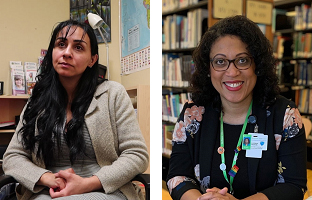
Recognizing Women in the field of Newcomer Navigation
Shler Ali is a Settlement Worker with MOSAIC Newcomer Family Resource Network, in Winnipeg, Manitoba.
Lorraine Thomas is a Family Support Specialist and Health Literacy lead at Holland Bloorview Kids Rehabilitation Hospital, Toronto.
I myself was a refugee and I understand the fear, trauma and challenges of refugees having gone through this experience. Due to the on-going civil war, the persecution of my own Kurdish people, and the destruction of my home, in 2012, I was forced to flee my native land of Syria, and seek refuge in Kurdistan, Iraq where I struggled for four years before finally making my way to Canada in 2016.
I encountered many new challenges trying to settle into my new country of Canada. One of them was the fact that my degree as an electrical and telecommunications engineer was not recognized here so I could not get work in the field for which I was trained. It was challenging for me to settle into my new country but after several months I started working in the settlement sector with MOSAIC Newcomer Family Resource Network in Winnipeg, because I had the passion and the understanding to help other newcomers. I have been working here, at MOSAIC for four and half years now.
In 2014, there were reports that ISIS had attacked numerous Yazidis and some Christian villages in the mountainous region of Iraq. The Yazidi people have been historically the victims of aggression by various groups. The Yazidi villages, situated in the mountains, made it difficult for their people to escape. Many who tried to flee through these mountains but were unable to; some fell to their deaths, some died from hunger, some died from the harsh environment.
Of the Yazidis who were captured by ISIS, most of the men were executed or imprisoned. Younger males were forced to join ISIS or face death or imprisonment. The Yazidi women were sold as sex slaves or servants. Some of these women are still missing, assumed to be in captivity.
Yazidi families were ripped apart and destroyed by the atrocious acts of ISIS. This news spread around Iraq. I, like many other refugees in the country at the time, was filled with uncertainty and concern for my safety.
In 2017, the first group of Yazidi refugees arrived in Winnipeg. Because of my ability to speak Kurdish and Arabic, I was able to converse with the Yazidi women. I had a solid understanding of the trauma they had been through, the historical persecution they had endured, and the sensitive social elements of their culture. These attributes were essential in my role as an interpreter with them and as someone who understood their culture and customs.
Speaking their language helped me to build a relationship with them. It was important to be patient with them: helping them to feel safe and secure, letting them set the pace at which we engaged, letting them determine when and what we talked about.
When their language classes began, we started to have conversations very slowly, but eventually the nature of the talks grew deeper, more personal and emotional. When they were ready, they opened up and talked about the trauma they had experienced.
They had received psychological counselling and therapy from other agencies prior to arriving in MOSAIC, but we provided them with additional support to meet their daily personal and emotional needs in settling into a brand new country, because, starting over in a new country is itself, another traumatic event for them.
After having been violated, losing their loved ones, separated from their families and forced to flee their country, we can only admire their resilience as they try to adapt to their new home in Canada, learning a new language, and a whole new system of daily life. Our culturally sensitive programs at MOSAIC, and the fact that our staff is a culturally diverse one that reflects the culture of the newcomers we serve, are instrumental in our ability to help and support new Canadians to settle into our country.
Lorraine Thomas has over 20 years of experience working with families of children with disabilities, many of whom are newcomers. While her clients and families have diverse socio-ethno-cultural origins, having come from countries such as Brazil, China, Sri Lanka, Syria, and the Phillipines, they all face the common challenge of being unable to connect effectively to the complex Canadian health and social services systems.
It is very challenging for newcomers to get a foot in the door to access health and social services for their families. These are individuals who often have had to overcome many difficult, even life-threatening obstacles to get to Canada, and once they get here, they face numerous additional barriers to care.
My own lived experiences on so many levels: as a newcomer who immigrated from the Caribbean to Canada, being a visible minority woman, and living with a disability, has given me authentic insight and understanding about the challenges that many newcomers experience. The N4-SPU on-line program in newcomer navigation, provided me with additional validation of my personal and professional experiences and how they serve me in my role working with refugees, immigrants, asylum seekers and marginalized newcomers. In particular, I found that the Social Justice course gave me an academic vocabulary with which to express my intuitive and experiential knowledge. I feel empowered by the program, especially regarding my abilities to advocate for my clients and families and to engage with more confidence in interdisciplinary knowledge transfer and sharing with my colleagues across the different sectors.
Comments
Login to Post a CommentNo login? Please enter your details below to continue.


